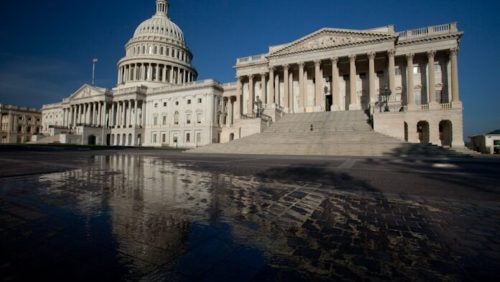How the Inflation Reduction Act May Take a Similar Path Through Congressional ‘Repeal’ as The Affordable Care Act
April 22, 2025 by Daniel Hogg

The United States Capitol building and its reflection in a pool of water.
Tariffs on U.S. produced goods are already disproportionately targeting right-leaning communities. Republican lawmakers may add to the price disruption by repealing the Inflation Reduction Act. This blog examines the political calculations currently facing Congressional Republicans as they try to undo Biden’s climate change legacy.
The Inflation Reduction Act (“IRA”) was passed in 2022 and was heralded as the largest investment in clean energy technology in United States’ history.[1] Notably, the IRA was passed along strict party lines, with no Republican votes.[2] The provisions of the IRA are broad, with reforms to corporate taxation, prescription drug costs, health care, deficit reduction, domestic job-creation, and environmental policy.[3] The IRA was the policy fixture of the Biden administration’s effort to achieve its climate goals, which included achieving 100% carbon pollution-free electricity by 2035, a 50-52% reduction of economy-wide net greenhouse gas (GHG) pollution from 2005 levels in 2030, and net-zero emissions economy-wide by 2050.[4] The IRA additionally includes numerous tax credit bonus provisions designed to bolster the domestic labor force.[5]
Now, three years following the passage of the IRA and with Republicans in control of all three branches of government, it would seem a repeal of the IRA is forthcoming. On the campaign trail, President Trump pledged to “terminate” the law on his first day in office.[6] The House Committee on Ways and Means has emphasized what it characterizes as the rapidly increasing expense of “green corporate welfare” associated with the IRA.[7] However, as the various repeal efforts circulate, a number of Republican members of Congress are coming out in support of the IRA.[8] This blog post attempts to explain the durability of the IRA, and how a full repeal of the IRA could be politically calamitous to the Republican Party in the 2026 midterms.
Republican-leaning states and congressional districts have emerged as the primary beneficiaries of the IRA. Over the course of the law’s first two years, more than half of all announced clean energy projects have been located in Republican-held districts.[9] And notably, 19 of the 20 congressional districts receiving the highest levels of clean energy investment are represented by Republican lawmakers.[10] Overall, nearly 40% of the 435 U.S. congressional districts hosted at least one announced project under the IRA.[11] Investment in Iowa—home state of Senate Finance Committee leader and third in line to the presidency Chuck Grassley—rose by 40% to $2.7 billion.[12] Therefore, while solar panels and decarbonization efforts may be politically unpopular in some circles, threat to jobs is even more unpopular. A full repeal of the IRA would have disproportionate economic burdens on right-leaning congressional districts. And, at a time when foreign governments are already targeting manufacturing in these districts with tariffs,[13] further economic burden could be devastating for rural manufacturing communities.
So, while the Inflation Reduction Act may be a bullseye for repeal amongst Trump administration officials, its fate may take a path similar to the Affordable Care Act: an achievement of the prior administration that is unpopular with the Trump administration, yet a politically perilous repeal with Congress.
[1] Will Ragland, Colin Seeberger & Emily Gee, Top 11 Benefits of the Inflation Reduction Act, Center for American Progress (Aug. 9, 2022), https://www.americanprogress.org/article/top-11-benefits-of-the-inflation-reduction-act/.
[2] See Rebecca Goldman, What Are the Inflation Reduction Act and Budget Reconciliation?, League of Women Voters of the U.S. (Sept. 1, 2022), https://www.lwv.org/blog/what-are-inflation-reduction-act-and-budget-reconciliation.
[3] House of Representatives Committee on the Budget, The Inflation Reduction Act (2022), https://www.congress.gov/bill/117th-congress/house-bill/5376/text.
[4] U.S. Dept. of Energy, On The Path to 100% Clean Electricity, (May, 2023), https://www.energy.gov/sites/default/files/2023-05/DOE%20-%20100%25%20Clean%20Electricity%20-%20Final.pdf.
[5] See Inflation Reduction Act (IRA) Summary: Energy and Climate Provisions, bipartisan policy center (Aug. 4. 2022).
[6] Kelsey Tamborrino, Trump vows to pull back climate law’s unspent dollars, Politico (Sept. 9, 2024), https://www.politico.com/news/2024/09/05/trump-inflation-reduction-act-00177493.
[7] U.S. House of Representatives Committee on Ways and Means, As Cost of Democrats’ Green Corporate Welfare Skyrockets, Big Business and China Profit, https://gop-waysandmeans.house.gov/wp-content/uploads/2023/04/230421-Two-Pager-Green-Energy-Credits-FINAL.pdf.
[8] Josh Siegel & James Bikales, House Republican support grows for keeping clean energy tax breaks, Politico (Mar. 10, 2025), https://www.politico.com/news/2025/03/10/house-republican-clean-energy-tax-breaks-00218126.
[9] Clean Economy Works | IRA Two-Year Review, E2 (Aug. 14, 2024), https://e2.org/reports/clean-economy-works-two-year-review-2024/.
[10] Id.
[11] Id.
[12] Amanda Chu, Senior Republicans seeking to tear up IRA enjoy $130bn investment spree, Financial Times (Feb., 2025).
[13] Giovanna Coi, Paroma Soni & Camille Gijs, EU targets Trump’s red states with tariffs on US trucks, cigarettes and ice cream, Politico (Apr. 9, 2025), https://www.politico.eu/article/eu-tariffs-trade-war-donald-trump-republican-states/.

